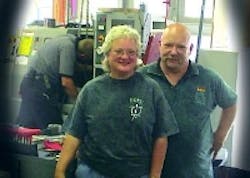Miniature Manufacturing On A Worldwide Basis
Even with a small shop, Tamara and Jim Whipple have global customers.
JIM WHIPPLE HAS THREE MANUAL machines — a 12 in. by 26 in. manual lathe, a jeweler's lathe and a manual Bridgeport mill — three CNC milling machines, and customers around the world.
Whipple runs a shop with five employees, including his wife, Tamara, the official owner of Phinney Bay Machine Works, and an apprentice.
While Whipple has been a machinist for more than 36 years, the Phinney Bay operation is in its second full year as a production shop.
"We are a young and a miniature manufacturing facility, but I compete with people around the world," Whipple says. While Whipple's current shop does not have the history many others do, he brings to it experience that includes owning and operating a machine shop in Woodenville, Wash., that had 50 employees.
As the result of an expansion in mid-August, Phinney Bay Machine Works now has CNC milling machines with work envelopes of 16 in. by 12 in. by 10 in., and 24 in. by 12 in. by 18 in., and a CNC lathe with a work envelope of 16.25 in. by 14 in. and 1.75 in.-diameter bar capacity.
Whipple has landed contracts and work from customers that range in location from South Africa to Japan, and from Australia to Germany. And he says he keeps his eye on his customers and works to meet their needs with no returns to maintain the business.
As is typical for a small, new shop, Whipple says he is, for now, specializing in prototype and custom work, with fast turn-around time and immediate customer response. In prototype and custom work, estimating the value of a job is paramount, and Whipple says he has developed good insight on how to do it well.
"When you make enough parts, you get a good feeling for the time it will take to machine something, no matter what the material is," he says, adding that his ability to estimate machining time accurately has led to work and profit for his company. Whipple is also working to increase profit in several other ways.
He is making his company compliant with ISO manufacturing processes in the coming year, so that he can broaden his customer range. While he said he does not expect to have ISO certification by the end of 2007, he said he will be moving toward gaining that certification.
Whipple closely tracks tool use and tool life, and he is making sure that he has the tools on-hand he needs to get jobs done since the shop's location is a ferry boat-ride away from Seattle. He also wants to ensure that he has no machine downtime.
"The downtime waiting for a tool is more expensive than the cost of the tool," he said, so he often doubles up on tooling to get a job done.
Also, he is cross-training his employees so that they have the ability to work on any machine in the shop and do any task that has to be performed.
"In a small shop, you have to wear a lot of hats. Sometimes the deburring guy has to be the quality-control guy, and you have to know what you're looking at and how to look at it to get it right," he says.
And, he said he is participating in the training of new machinists in two ways. He hires and trains machine operators when he can, and he has an apprentice who is associated with the West Sound Technical Skills Center, a
local technical school for high school juniors and seniors. Whipple provides work experience that augments the formal training the apprentice gets at the tech center, where he and Tamara are members of an advisory committee for mechanical studies.
Phinney Bay Machine Works West Bremerton, Wash. www.pbmwgroup.com |
